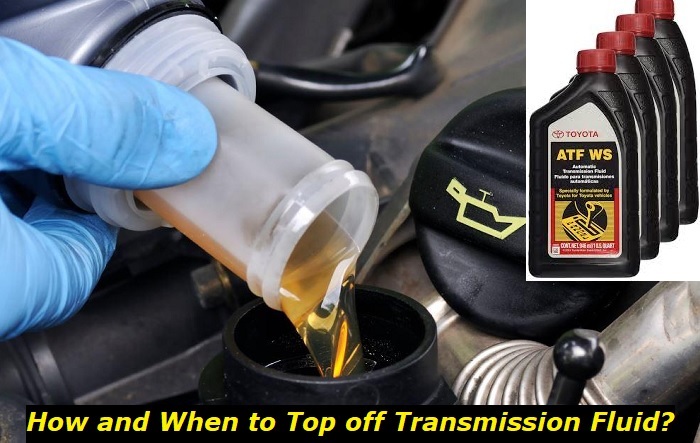Transmission is a complex and precise system, and it requires specialized knowledge to properly diagnose and address any issues. As a result, topping off transmission fluid should be left to the certified experts with the necessary skill set. More than that, repairing transmission can be quite costly, and doing it yourself could end up being a much more expensive endeavor than necessary.
Fluid change in transmissions highlights
- Level of importance:High
- Time interval:Once every 60,000 miles or 10 years (if other not stated by the manufacturer)
- Needed expertise:High
- Needed tools:Basic set of car maintenance tools, plus car lift
- Time taken:2-4 hours
- Possible issues:Fatal failure of your transmission, jerking, harsh work, vibrations, limp mode, no shifting.

What is transmission fluid, and what is its purpose?
Transmission fluid is a lubricant specifically designed to keep the components of your vehicle's transmission in good working order. It helps reduce friction between moving parts, protects against corrosion, and provides proper cooling for your transmission.
The purpose of transmission fluid is to prevent excessive wear and tear on the internal parts of the transmission, as well as to help optimize performance and fuel economy. Additionally, transmission fluid helps reduce the noise generated by your vehicle's transmission when in operation.
Without proper lubrication provided by transmission fluid, gears and shafts may wear prematurely, eventually resulting in costly repairs or even a complete replacement of the transmission. Changing your vehicle's transmission fluid as recommended will help to keep your transmission system in good working order.
Why is it important to top off transmission fluid by an expert?
When addressing transmission fluid levels, the experts take into account many factors that an amateur would not know to consider. For instance, checking for any leaks or signs of contamination is essential in order to be able to top off the fluid correctly and safely. Topping off transmission fluid yourself may lead to overfilling and cause further damage or even potentially create a hazardous situation.
It is also important to take into account the type of transmission oil needed for your vehicle; each one is different and requires special attention when topping off in order to ensure that it provides optimal performance.
It should be noted that if your transmission fluid levels are low, topping off transmission fluid is not enough to address the issue. Low transmission fluid levels may be caused by a leak or other factor and thus requires expert diagnosis in order to resolve it properly.
Therefore, topping off should only be done as part of an overall repair and maintenance process that involves experienced professionals who understand the complexities of your vehicle's transmission system.
How overfilling a transmission fluid can damage your car?
When you overfill the transmission fluid of your car, it can cause serious damage to it. The extra fluid can put too much pressure on the seals and gaskets in the transmission, causing them to wear down more quickly or even break.
Overheating is also a common problem when transmission fluids are overfilled because excess fluid prevents air from circulating and cooling down the transmission. Additionally, if too much fluid is added to a low-level transmission, pockets of air can form, which may lead to clogged filters and pump cavitations that ultimately reduce performance.
The extra weight of the fluid can also lead to more strain on the engine and possible damage in other areas, such as oil pans and seals. All in all, overfilling a transmission fluid can be very damaging for your car, so it is important to use professional help when refilling the fluid to make sure you get the right amount.
What are the most common causes of low transmission fluid levels?
The most common causes of low transmission fluid levels include transmission leaks, worn seals, or degraded components. It is important to address these issues as soon as they become apparent in order to prevent further damage and the need for costly repairs. Maintaining proper transmission fluid levels through regular inspections and topping off can help to extend the life of your vehicle's transmission system.
Some cars come equipped with a transmission dipstick to help you keep an eye on transmission fluid levels; however, if your vehicle does not have one, it is best to take it to a professional for the appropriate diagnosis and topping off.
How to identify transmission fluid leaks?
You may be able to identify a transmission fluid leak by looking for any dark or oily spots on the ground beneath your vehicle. If you detect any leaks, it is best to take your vehicle to a professional mechanic for diagnosis and repair.
Additionally, you can check the dipstick or transmission oil filler cap for signs of low levels or contamination. If there is a burnt smell coming from the transmission, this may be a sign of an overfilled or contaminated system. It is also important to be aware of any noises, such as grinding, whining, or humming, that could indicate a problem with your transmission.
What happens if you don't top off transmission fluid when needed?
If you don't top off transmission fluid when needed, your vehicle's transmission system is at risk of being damaged. Low levels of transmission fluid can cause gears and shafts to wear prematurely, decreasing performance and potentially leading to costly repairs or even a complete replacement of the transmission.
Topping off transmission fluid as recommended will help to keep your car's transmission in good working order and prevent any serious damage from occurring. Additionally, it is important to use the correct type of fluid for your vehicle, as different types may be incompatible or cause even further damage to the transmission system.
To ensure that you get the right kind of fluid, it is best to consult a professional mechanic for advice.
What is the process of topping off transmission fluid?
Once it is determined that topping off transmission fluid is necessary, the process involves adding the right amount of high-quality oil as recommended by the vehicle's manufacturer. The experts will then check for any signs of leakage or contamination and if there are none, proceed to add the necessary amount of oil and recheck levels.
There are several steps involved in the topping-off process, including inspecting the transmission fluid lines and hoses, checking for debris or any other signs of damage, and testing the pressure. After all of these steps are completed, they will then top off your vehicle's transmission fluid with clean oil and adjust it if necessary.
What is the cost of topping off transmission fluid?
The cost of topping off transmission fluid will vary depending on the vehicle make, model, and type of service required. Generally speaking, it is a relatively inexpensive procedure and can be completed in under an hour.
You can expect to pay anywhere from $50 to $150 for the service, depending on the complexity of the job. However, if there is any major damage done to your transmission or if additional repairs are needed, the cost will likely be more expensive. Be sure to consult a professional for any further information about the costs associated with topping off transmission fluid.
When should you top off the transmission fluid?
It is generally recommended to top off the transmission fluid at least once every two years or 24,000 miles for manual transmission, whichever comes first. However, this may vary depending on your vehicle manufacturer's specifications and recommendations. If you have an automatic transmission, it is recommended to top off your transmission fluid every 30,000-60,000 miles.
Bottom Line
Topping off transmission fluid is an important step in keeping your vehicle's transmission system running smoothly and avoiding costly repairs. However, it should only be carried out by qualified professionals who can properly diagnose the issue and ensure that the correct oil is used for your specific model of car.
If you suspect there may be a leak or other issues causing your transmission fluid levels to be low, it is best to take your vehicle in for professional inspection and repair. Doing so will help you avoid costly repairs and keep your car running better for longer.
About the authors
The CarAraC research team is composed of seasoned auto mechanics and automotive industry professionals, including individuals with advanced degrees and certifications in their field. Our team members boast prestigious credentials, reflecting their extensive knowledge and skills. These qualifications include: IMI: Institute of the Motor Industry, ASE-Certified Master Automobile Technicians; Coventry University, Graduate of MA in Automotive Journalism; Politecnico di Torino, Italy, MS Automotive Engineering; Ss. Cyril and Methodius University in Skopje, Mechanical University in Skopje; TOC Automotive College; DHA Suffa University, Department of Mechanical Engineering






Add comment